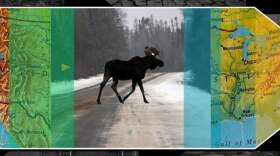-
More than 240 million gallons of raw sewage were spilled into the Potomac River when a major pipeline collapsed in mid-January.
-
The federal government plans to pay to keep coal plants open longer. It recently selected Duke Energy’s two-unit coal-burning plant to receive up to $34 million.
-
Warming temperatures and no snow are problems in Western states, where winter sports are a billion-dollar industry.
-
Last week, the EPA rolled back a key climate finding that gave the federal agency the authority to regulate greenhouse gas emissions. Wednesday morning, environmental groups took the EPA and its administrator, Lee Zeldin, to court.
-
The number of moose in Minnesota is about half what it was just 20 years ago.
-
Many experts had thought sharks didn't exist in the frigid waters of Antarctica.
-
Scientists believe there are only a few hundred black-footed ferrets still living in the Western United States. The carnivores once thrived on the plains between Canada and Mexico, but humans plowed up their habitat, and diseases like sylvatic plague reduced their numbers even further.
-
The fight to slow human-caused climate change has taken another major setback.
-
On a trip through North East Washington in the 1970s, couple Lynn and Becky Miner fell in love with the stunning nature around them.
-
Skiers would typically use waxes with PFAS to lubricate their skis to go downhill faster.
-
Starting Thursday, the Environmental Protection Agency will no longer regulate pollutants from fossil fuels, such as methane and carbon dioxide, under the Clean Air Act.
-
A collapsed sewer line, about 8 miles from the White House, pumped 368 Olympic-sized swimming pools worth of wastewater into the Potomac. Repairs could take longer than previously expected.










